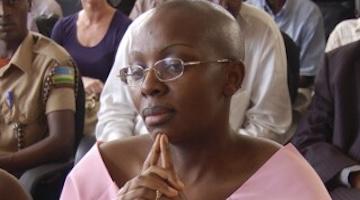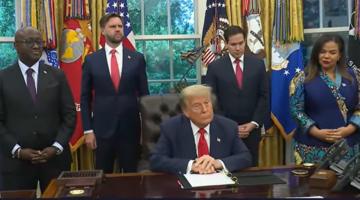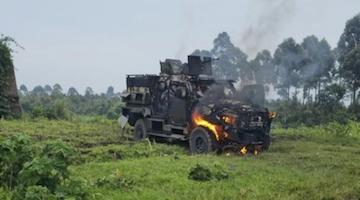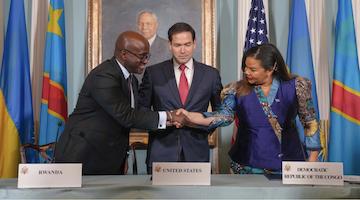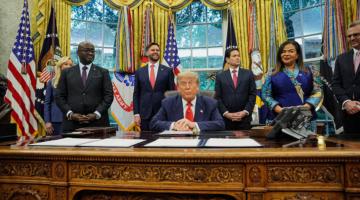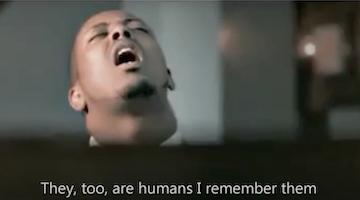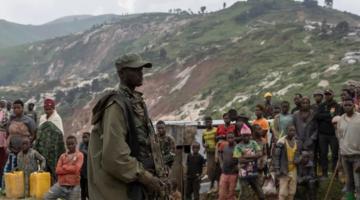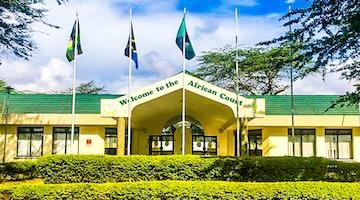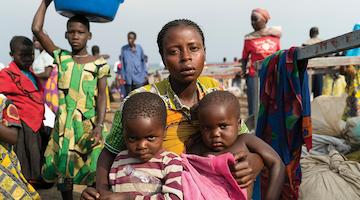Victoire Ingabire and her attorney, Peter Erlinder, seen here in Rwanda's pink prison garb. Peter was arrested and charged with genocide denial after traveling to Rwanda to defend her.
This year’s Victoire Prize went to ICTR lawyers David Jacobs and Peter Erlinder and Canadian journalist Jooneed Khan.
Before 2010, Victoire Ingabire Umuhoza led a comfortable, prosperous life in The Netherlands. She was happily married with three children. With advanced degrees in both business and law, she had a very good job with an international firm. Thanks to her intelligence, eloquence, and compassion, she had also become the undisputed leader of the Rwandan diaspora opposition to the criminal and totalitarian regime of Rwandan President Paul Kagame.
In January 2010, Victoire left the Netherlands to return to Rwanda, saying she couldn’t continue to see her people suffering. She said she would “throw a brick at that wall” and that if she were imprisoned or assassinated, others must pick up the struggle behind her.
She declared her intent to run against Kagame in that year’s so-called presidential election, which Kagame reportedly won by an implausible 93%, but she was never even allowed to register her party. Kagame’s courts sentenced her to 15 years in prison instead, then released her eight years later, arguably in response to international pressure that included the African Court of Human and Peoples’ Rights ruling that she had been unjustly imprisoned and the African Bar Association’s call for her release.
Upon her release, the government forbade her to leave Rwanda, knowing that she would find a much larger audience beyond Kigali to speak about the regime. She has nevertheless found voice in Al Jazeera, The Guardian, African Arguments, and the Kenyan publication The Elephant.
She is constantly vilified, intimidated, surveilled, and threatened with re-imprisonment in Rwanda, and many of her associates have been disappeared, arrested, or killed. Right now eight members of her opposition party, DALFA Umurinzi, are on trial, after three years of pretrial detention, for owning a book about nonviolent resistance to authoritarian regimes. She has continued to say that she is prepared to be arrested again or even assassinated, as she did when ESPN interviewed her for their investigative documentary “How the NBA got into business with an African dictator.”
In her essays for the international press, Victoire has explained the extreme repression and hardship that Rwandan people suffer under the Kagame regime. Most recently she reported on the UN Food and Agriculture Organization’s conclusion that much of the Rwandan population suffers from hunger. “The number of undernourished people in Rwanda,” she wrote, “has increased from 3.3 million in 2004–2006 to 4.3 million in 2021–2023.” That’s in a population of 14 million.
Where is the memorial to the Hutu?
Upon Victoire’s arrival in Kigali in 2010, she went straight to the Gisozi Genocide Memorial Centre and asked, “Where is the memorial to the Hutu?” As she herself wrote twelve years later, in Al Jazeera, she “demanded they also recognise and honour all the others who had fallen victim to violence before, during and after the genocide against the Tutsi.”
She also said that true reconciliation between Rwandans would be impossible till the truth about what they had suffered was told.
She was immediately put under house arrest for “genocide denial,” but that drew global attention to the long, hard-fought battle to honor all the victims. It was a battle to acknowledge that the four-year, 1990-1994 Rwandan war and its final 100 days were a complex reality of inter-ethnic and politically motivated violence, not a simple Manichean tale of demon Hutus massacring innocent Tutsis.
Then General, now President, Paul Kagame led his predominantly Tutsi army to victory in that war, seizing power in Kigali in July 1994. Then with the help of the Simon Wiesenthal Center, the National Holocaust Museum, the State of Israel, and the International Criminal Tribunal for Rwanda, he established the simple tale equating it to the Holocaust. This has been his Tutsi supremacist regime’s excuse for ruling with an iron fist and waging war in Congo for the last 30 years. Millions of Congolese have died while he claims that he and/or his proxy militias are protecting Congolese Tutsis from another genocide.
The Victoire Ingabire Umuhoza Democracy and Peace Prize, 2025
Before Victoire turned attention to the complex reality of the Rwandan war and genocide, international criminal defense attorneys defended Hutu people who were singularly and unjustly accused at the International Criminal Tribunal for Rwanda. Between its founding in November 1994 and its closure in December 2015, the court prosecuted only Hutus. By doing so, it reinforced the simple tale.
Two of those criminal defense attorneys received this year’s Victoire Ingabire Umuhoza Democracy and Peace Prize, which the International Women’s Network for Democracy and Peace established to honor Victoire and keep her struggle in the public eye. They are:
Peter Erlinder Peter received the award posthumously, having died in December 2024 after a long battle with cancer. He not only represented defendants at the ICTR, but also traveled to Rwanda in May 2010 to defend Victoire, who was still under house arrest.
Peter was immediately arrested and jailed for “genocide denial,” the same “crime” that Victoire had been arrested for. The simple “genocide against the Tutsi” tale is legally codified and enforced in Rwanda. It took an international campaign waged by activists and jurists all over the world to get Peter out of Rwanda.
While defending clients at the ICTR, Peter collected hundreds of pages of primary sources which became the Rwanda Documents Project. He intended for this collection to remain online for as long as the Rwandan war and genocide is remembered, but to my dismay, it has become all but impossible to find. Amazon simply says "this book is no longer in print," and no used or electronic copies are available.
I have an electronic copy that I hope to see stored by the Internet Archive.
David Jacobs David represented Rwandans before the ICTR in trials and appeals with some success.He also helped organize a group of lawyers who refused to be toys of the unjust court. They believe that Rwandans tried and imprisoned by the ICTR have been political prisoners because the ICTR was created to continue the war that Kagame waged with the help of the US.
They came together in Toronto to ensure that future Rwandan defendants brought before the International Residual Mechanism for Criminal Tribunals would be assured of representation by lawyers who would actually fight for them. They also won early release for some and the right to decent medical care for those still imprisoned.
David spoke to Phil Taylor, host of the the Taylor Report on CIUT-FM-Toronto about how a British appeal court concluded that justice is not credible in Rwanda and protected an asylum seeker.
In 2014, he contributed an essay, “How the International Criminal Law Movement Undermined International Law—Michael Mandel’s Groundbreaking Analyses” to Justice Belied: The Unbalanced Scales of International Criminal Justice. There he wrote, “Similarly, the ICTR has never prosecuted any member of the Rwandan Patriotic Front, which emerged as the victor in the 1990-1994 war against the Rwandan Government. The victorious RPF regime was described by Michael [Mandel] as ‘a Washington client.’ The ICTR Prosecutor ‘confessed that she had to ignore RPF crimes, or the RPF government would shut her down.’”
Jooneed Khan The award was also given to Jooneed Khan, a Mauritius-born journalist who worked at La Presse in Montreal. Since 1992, Jooneed has published articles to help the world understand what he calls the “War against Rwanda” led by the RPF, and he continues to support the struggle, speaking in Canada, particularly in Montreal.
The ICTR lawyer who nominated Jooneed wrote, “He was aware of our fight so that the accused at the ICTR could choose their lawyer. This became a question of principle in 1998-1999 when the Registrar blocked me from defending Jean-Paul Akayesu. Jooneed followed this fight closely and published a major article in La Presse. We then won the battle to let the accused choose their own lawyers rather than being assigned lawyers by the ICTR.”
David Jacobs, Peter Erlinder, and Jooneed Khan have all contributed greatly to the cause of justice in Rwanda. They have also contributed to the cause of justice in the Democratic Republic of the Congo because the fates of these two countries have long been intertwined.
Ann Garrison is a Black Agenda Report Contributing Editor based in the San Francisco Bay Area. In 2014, she received the Victoire Ingabire Umuhoza Democracy and Peace Prize for her reporting on conflict in the African Great Lakes region. She can be reached at ann@anngarrison.com. You can help support her work on Patreon.

